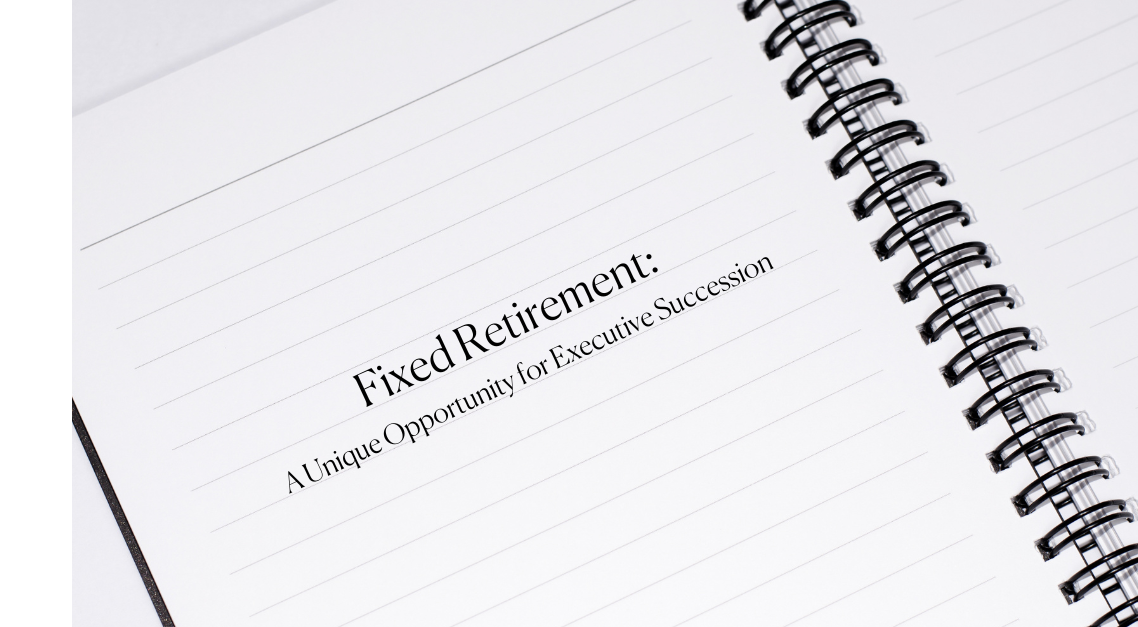
Fixed Retirement : A Unique Opportunity
Fixed Retirement Dates: A Unique Succession Opportunity for Executives
By: Leslie W. Braksick, PhD, MPH
Even with robust succession planning, executive retirement is often complicated. Nearing retirement, executives often become distracted by the transition, while the company faces losing their valuable organizational knowledge and experienced insight. With that, key client relationships and operating teams get disrupted, and transitioning executives become anxious when they lack a plan for what’s next.
Approaching executive retirement, focusing on Finishing Well and Leaving Well neutralizes these risks. Executives who Finish Well and Leave Well make valuable contributions leading up to retirement: Successor readiness increases, team stability is protected, and clients feel valued and well-served.
The organization sees experience and eminence as overtly recognized and honored, advancing a culture of confident leadership, transparency, and care. Concurrently, executives enter postretirement life feeling prepared and speaking well of their organization and what it stands for. This positive transition can be particularly valuable for executives who go on to join boards or become influencers in the market. We also know how hard this can be.
- Executives are reluctant to discuss their departure: “What will my leader and colleagues think? What if they think I want to leave? What if they say, ‘Great, you can go now’? What if they take away all my responsibilities and embarrass me? What if I sound ungrateful, disloyal, or disengaged?”
- CEOs and CHROs, concerned about the impact of the executive’s departure, are equally reluctant to touch on the topic: “What will she think? What if he thinks we want to fire him? What if she’s insulted and decides to quit, or worse, to sue? What if he tells the rest of the executives he’s being eased out, and it could happen to them, too? What might she tell her clients? What if he pulls back when we need him to lead something important?”
Executive retirement transitions, done well, require a conversation that both sides want (and need) to have but which neither side wants to initiate.
Fixed Retirement Dates—A Risk and an Opportunity
Having negotiated retirement dates in place for your senior executives or partners does not eliminate the risks. Executives still require focused conversation and support, so they don’t become unnecessarily distracted, coast, hold onto organizational responsibilities until the bitter end, impede or block timely succession, or leave clients dissatisfied with how the transition occurred.
In addition, there are distractions and difficulties for active executives who watch the transition unfold and for external audiences whose perceptions of your organization are influenced by the retiring executive.
Having a negotiated retirement age in place brings the benefit of a conversation on timing. You have safe grounds to converse about it well in advance. Actively doing that accomplishes three things:
- You can plan collaboratively for how the executive’s retirement will take place, regardless of the timing (even if the company decides it is best for the executive to retire ahead of the mandatory date). The proper requests and commitments can secure the executive’s commitment to work toward a quality transition and satisfaction that the organization honors and celebrates their contributions.
- Finishing Well becomes part of the employment experience and culture—bringing benefits:
• Emerging leaders get better mentorship.
• Client relationships are transitioned smoothly, thoughtfully, and expeditiously.
• Team performance is protected because the transition is intentional, disciplined, and communicated.
• Executives engage (differently) with colleagues and organizations that prepare them for their Next Season.
• The company overtly practices values around client experience, professional development, and people-centric culture. The talk is seen to walk. - Executives can actively plan for what’s next in an open and honest manner and with less anxiety and greater confidence, making them more supportive influencers postretirement.
What We Know
More than a decade of research and work has confirmed one key fact: Executives who are supported actively to prepare for and transition well do better than those who leave without a plan for what’s next. With a plan, they lean into what’s next, find success earlier, thrive with new networks and relationships, and find opportunities. By supporting executive transitions pragmatically and with heart, executives realize joy and purpose in their next season, and the company culture, image, and reputation are enhanced both with clients and with those who remain and are watching.



